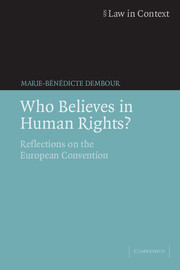Book contents
- Frontmatter
- Contents
- Acknowledgements
- Table of cases
- List of tables
- 1 Introduction
- 2 The Convention in outline
- 3 The Convention in a realist light
- 4 The Convention in a utilitarian light
- 5 The Convention in a Marxist light
- 6 The Convention in a particularist light
- 7 The Convention in a feminist light
- 8 The human rights creed in four schools
- 9 Conclusion: In praise of human rights nihilism
- Appendices
- Select Bibliography
- Index
6 - The Convention in a particularist light
Published online by Cambridge University Press: 03 February 2010
- Frontmatter
- Contents
- Acknowledgements
- Table of cases
- List of tables
- 1 Introduction
- 2 The Convention in outline
- 3 The Convention in a realist light
- 4 The Convention in a utilitarian light
- 5 The Convention in a Marxist light
- 6 The Convention in a particularist light
- 7 The Convention in a feminist light
- 8 The human rights creed in four schools
- 9 Conclusion: In praise of human rights nihilism
- Appendices
- Select Bibliography
- Index
Summary
How can the proposed Declaration be applicable to all human beings, and not be a statement of rights conceived only in terms of the values prevalent in the countries of Western Europe and America?
(Herskovits)Cultural relativism is widely recognized as the doctrine which stands opposed to the idea, central to the human rights credo, that human rights are universal. It is generally understood as asserting that each culture nurtures its own values and ways of being and doing; is understandable and must be understood within its own terms; and should not be morally assessed by a culture external to it, even in the name of human rights. The doctrine tends to result in a denunciation of human rights as an expression of imperialism.
Discussions about human rights and relativism typically involve references to Asia, Africa and/or the Middle East. This is because the debate between universalism and relativism tends to be conducted as if it were concerned with how the rest of the world should react to something which originated in the West. This chapter springs from the view that this is not the most fruitful way to conceive of it.
The chapter shows that the debate is inescapable even within the confines of Europe, i.e. internally to the fairly homogeneous region from which human rights are said to have originated.
- Type
- Chapter
- Information
- Who Believes in Human Rights?Reflections on the European Convention, pp. 155 - 187Publisher: Cambridge University PressPrint publication year: 2006



